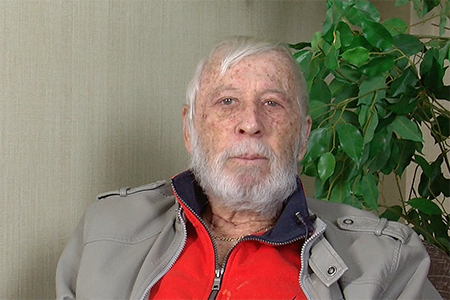
Bernard Leibman was born in Brussels, Belgium in 1938. His parents, Abraham and Chaja Sura were Polish Jews who had moved to Belgium during the interwar period, where his father was a leather goods manufacturer. Germany invaded Belgium in May of 1940, and the family remained in Brussels until spring of 1942 when it became clear that Jews would be rounded up.
At that point, Bernie’s parents secured hiding places for Bernie and his older brother, Jacques, in Wilrijk (near Antwerp) and false papers for themselves so they could check on the children. During those visits, they learned their sons were not being fed adequately.
Fortunately, in September of 1942, they found two families in the village of Tourinnes-St. Lambert, each willing to take one of the boys. Bernie was only 4 years old at the time but remembers attending church with the mother and daughter who hid him and being treated like part of the family. He visited Germaine and her daughter, Giselle many times after the war and in fact, they have been recognized as Righteous Among the Nations. Most of the village knew there were Jews hidden there but never turned anyone in.
The village had an active resistance force and in 1944, hid two American flyers who had crashed there. The village priest, Father Phillipe Laurent Cleeremans, assisted the boys and their parents while they were in hiding. During the 3 ½ years in hiding, Bernie saw his brother Isaac many times and their mother about a dozen times. She and their father were in hiding in Brussels and it was dangerous to travel – especially for men because Jewish men could always be recognized due to the practice of circumcision. Women could more easily travel with false identity papers.
To this day, Bernard Leibman is fearful of spotlights because Nazis used them to hunt down Jews. He recalls hearing rumbling and flashes from Battle of the Bulge, As Germans retreated, villagers shouted them down. Two days later, the first American GIs came into the village. Isaac and Bernard greeted them and that picture is featured in a book about the war.
After Belgium was liberated, the boys were reunited with their parents and they lived in Ixelles, a suburb of Brussels. A third son, Raymond, was born to the family in 1946. Most of Bernard’s extended family, who had remained in Poland, were murdered during the Holocaust. In 1946, the family, fearful that the Soviet Union would take over Western Europe, applied to emigrate to the United States. It took six years for them to get approved but in 1952, the family left for New York City, sponsored by a distant relative.
Biography written by: Bonnie Abrams, Director, Center for Holocaust Awareness and Information
 Belgium, hiding after the Nazi invasion
Belgium, hiding after the Nazi invasion

Life in America

This is my grand-father, my dad’s father. He was murdered by the Nazis in 1939, shortly after picture was taken.

Mom & Dad & me after the war,in1947 They survived, hiding In Brussels during the war

Mom & Dad in 1928. Dad was in the Polish army from 1924 to 1928

This is my grand-father, my dad’s father. He was murdered by the Nazis in 1939, shortly after picture was taken.


Fake Belgium ID cards issued by the priest in the small Belgium village where my brother and I were in hiding with local families. It allowed my mother to visit us every few months for the 4 year during of the war.

Older brother Jacques and I in the country in 1943. With our favorite pets

Our village was about 50 miles from Bastogne. After the Americans beat the Germans during the famous Battle of the Bulge. German retreating convoys passed through our village all day and all night, on their way back to Germany.
Two days later the first American patrol came into the village. Brother Jacques and I greeted them, they were our heroes

This is the house where I stayed from early 1942 to end of 1945

My young brother Ray, born in 1946. Mom and Dad, Germaine, she took me in. I called her Aunt Germaine and her daughter Giselle. This was in 1949, first time my Dad saw where I was hidden

This was the farm where my brother Jacques stayed, About a mile from where I stayed. At least the two ofus where together.
For those 3 ½ year we only saw my mother about a dozen times, it was not too safe for her to travel, German patrols were all over the place.
Most of the time they stayed in hiding in Brussels, moving frequently. My dad did not dare travel, and we did not see him for the whole duration of the occupation.

The family was very religious, they took me to church every Sundays.
The whole village knew that we were Jewish kids, no one every said a word, they just accepted us.
I think I was probably the only Jew who was ever baptized.

The village priest, always looked in on us, he issued the fake papers for my parents
 Rochester Holocaust Survivors Archive
Rochester Holocaust Survivors Archive 